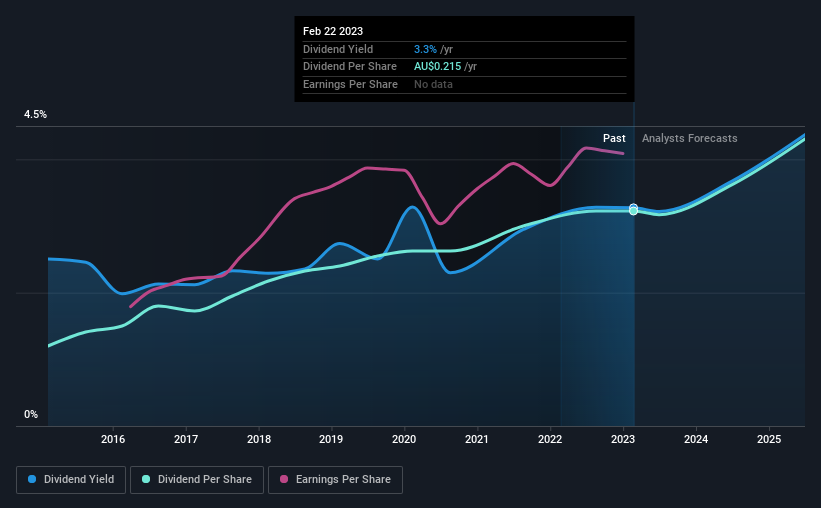- Australia
- /
- Retail Distributors
- /
- ASX:BAP
Bapcor Limited (ASX:BAP) Will Pay A AU$0.10 Dividend In Four Days

Regular readers will know that we love our dividends at Simply Wall St, which is why it's exciting to see Bapcor Limited (ASX:BAP) is about to trade ex-dividend in the next 4 days. Typically, the ex-dividend date is one business day before the record date which is the date on which a company determines the shareholders eligible to receive a dividend. The ex-dividend date is of consequence because whenever a stock is bought or sold, the trade takes at least two business day to settle. This means that investors who purchase Bapcor's shares on or after the 27th of February will not receive the dividend, which will be paid on the 17th of March.
The company's next dividend payment will be AU$0.10 per share, on the back of last year when the company paid a total of AU$0.21 to shareholders. Based on the last year's worth of payments, Bapcor has a trailing yield of 3.3% on the current stock price of A$6.57. Dividends are an important source of income to many shareholders, but the health of the business is crucial to maintaining those dividends. So we need to check whether the dividend payments are covered, and if earnings are growing.
Check out our latest analysis for Bapcor
Dividends are typically paid out of company income, so if a company pays out more than it earned, its dividend is usually at a higher risk of being cut. Bapcor paid out 61% of its earnings to investors last year, a normal payout level for most businesses. Yet cash flows are even more important than profits for assessing a dividend, so we need to see if the company generated enough cash to pay its distribution. Bapcor paid out more free cash flow than it generated - 158%, to be precise - last year, which we think is concerningly high. We're curious about why the company paid out more cash than it generated last year, since this can be one of the early signs that a dividend may be unsustainable.
Bapcor paid out less in dividends than it reported in profits, but unfortunately it didn't generate enough cash to cover the dividend. Cash is king, as they say, and were Bapcor to repeatedly pay dividends that aren't well covered by cashflow, we would consider this a warning sign.
Click here to see the company's payout ratio, plus analyst estimates of its future dividends.

Have Earnings And Dividends Been Growing?
Companies with consistently growing earnings per share generally make the best dividend stocks, as they usually find it easier to grow dividends per share. If earnings fall far enough, the company could be forced to cut its dividend. For this reason, we're glad to see Bapcor's earnings per share have risen 13% per annum over the last five years. Earnings have been growing at a decent rate, but we're concerned dividend payments consumed most of the company's cash flow over the past year.
Many investors will assess a company's dividend performance by evaluating how much the dividend payments have changed over time. Bapcor has delivered 13% dividend growth per year on average over the past eight years. It's exciting to see that both earnings and dividends per share have grown rapidly over the past few years.
Final Takeaway
Should investors buy Bapcor for the upcoming dividend? It's good to see that earnings per share are growing and that the company's payout ratio is within a normal range for most businesses. However we're somewhat concerned that it paid out 158% of its cashflow, which is uncomfortably high. While it does have some good things going for it, we're a bit ambivalent and it would take more to convince us of Bapcor's dividend merits.
However if you're still interested in Bapcor as a potential investment, you should definitely consider some of the risks involved with Bapcor. To help with this, we've discovered 1 warning sign for Bapcor that you should be aware of before investing in their shares.
A common investing mistake is buying the first interesting stock you see. Here you can find a full list of high-yield dividend stocks.
Valuation is complex, but we're here to simplify it.
Discover if Bapcor might be undervalued or overvalued with our detailed analysis, featuring fair value estimates, potential risks, dividends, insider trades, and its financial condition.
Access Free AnalysisHave feedback on this article? Concerned about the content? Get in touch with us directly. Alternatively, email editorial-team (at) simplywallst.com.
This article by Simply Wall St is general in nature. We provide commentary based on historical data and analyst forecasts only using an unbiased methodology and our articles are not intended to be financial advice. It does not constitute a recommendation to buy or sell any stock, and does not take account of your objectives, or your financial situation. We aim to bring you long-term focused analysis driven by fundamental data. Note that our analysis may not factor in the latest price-sensitive company announcements or qualitative material. Simply Wall St has no position in any stocks mentioned.
About ASX:BAP
Bapcor
Engages in the sale and distribution of vehicle parts, accessories, automotive equipment, and services and solutions in Australia, New Zealand, and Thailand.
Flawless balance sheet and good value.
Similar Companies
Market Insights
Community Narratives



